What It Takes: Learning the secret to success by training 5 weeks with a top lion dance troupe
In the second part of a series where CNA journalists experience what it takes to become a top performer in a particular field, Grace Yeoh spends over a month with Singapore Yiwei Athletic Association’s lion dance troupe after they clinch gold at a renowned international competition.

CNA's Grace Yeoh with the Singapore Yiwei Athletic Association's lion dance troupe at their training grounds in the Defu industrial area. (Photo: CNA/Marcus Mark Ramos)

This audio is generated by an AI tool.
SINGAPORE: What does it take to be number one – and topple your chief competitor who has reigned supreme for almost three decades?
More than underdog's luck, for sure.
After all, when the Singapore Yiwei Athletic Association broke defending champion Malaysia’s 13-edition winning streak over 28 years at the Genting World Lion Dance Championship in August 2023, it was not quite your average David versus Goliath tale.
Yiwei’s lion dance troupe is no stranger to the winner’s podium. In Genting, the other team fielded by the troupe placed third. And in September 2022, one of their teams won the first Prime Minister’s Cup International High Pole Lion Dance Championship in Kuala Lumpur, adding to their string of wins in previous years.
The Genting competition, however, has been dubbed the most established high-stilt lion dance championship in the world, attracting the best lion dance teams worldwide.
Admittedly, I hadn’t known there were international competitions for what seemed like a community-level sport. My exposure to lion dance has been limited to an annual disruption of peace and quiet during Chinese New Year when I hear the hallmark crack of drums and clang of cymbals reverberating throughout my estate.
But since young, I have been enamoured by excellence. We're taught to aim for nothing less, making it seem deceptively attainable; yet few come close. And what has always been more impressive than reaching the top is remaining there.
And so, for five weeks last year, I trained with Yiwei in search of the mastery that transforms the common man into a champion – and the magic that keeps them there.
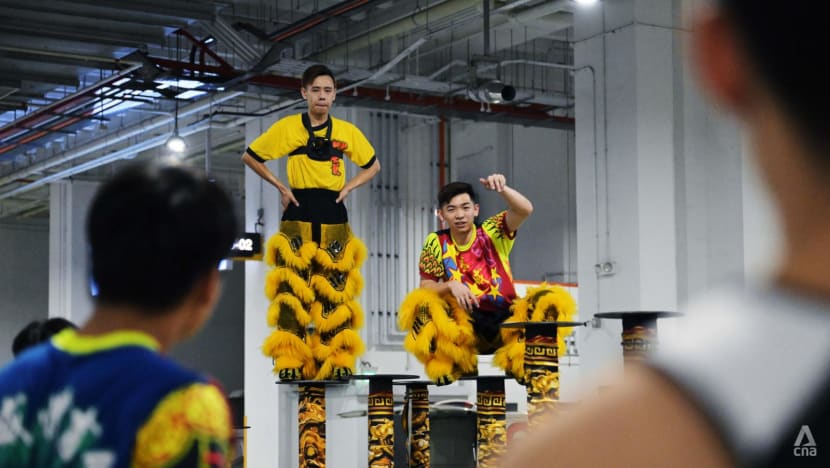
GETTING THE HANG OF BEAT, RHYTHM
One thing was immediately clear: There was no magic.
Just a dusty car park lot in the Defu industrial area that required sweeping before the start of every practice.
Yiwei's troupe comprises performers aged from 13 to their mid-20s, who are serving National Service, schooling or working full-time. They train on average four times a week in the evenings, and in the lead-up to competitions this intensity is bumped up to six times a week with breaks on Saturdays.
The troupe has since moved their training to Ang Mo Kio. They also have a smaller female team that trains in the Bukit Batok industrial area with similar rigour.
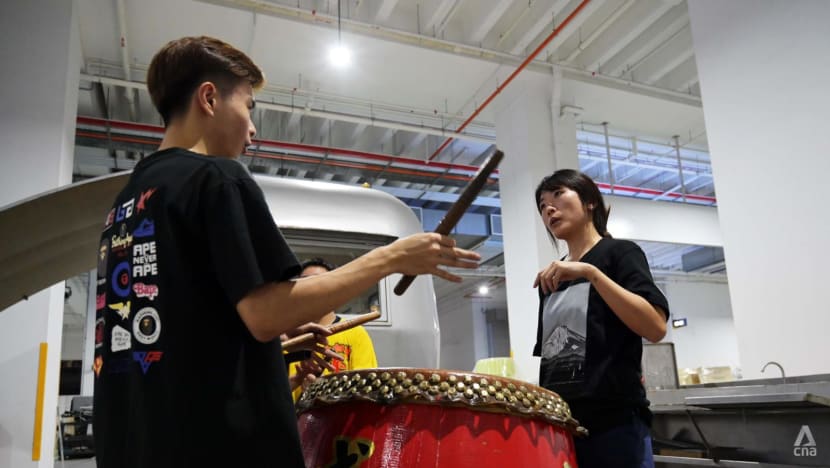
Like every newcomer, I started on the drum and cymbals. Mastering the basic beat and rhythm was akin to earning one’s stripes.
As Joson Li, a drummer for the troupe, put it, those on the instruments have a unique responsibility. The lion should "know what is going to happen next and know what's my next move or what's my signal to them".
This almost-telepathic relationship, built over years of coordination, is no less important than the bond between the pair of performers in each lion. But those on the instruments always get "left out" during media interviews, admitted the 36-year-old assistant leader.
"My performers (in the lion) are always being interviewed, but not the musical people. Actually, we also sacrifice a lot. They train, we train. We work as a team. Glory is theirs (because) they're doing risk-taking stunts; we're just standing on the floor. But we're adults; we don't take it to heart."
Li's commitment to his craft regardless of recognition was admirable, and it made me feel guilty that I'd written off his beloved role. I wanted to learn cool stunts like balancing on stilts and leaping from great heights – things that would actually challenge me.
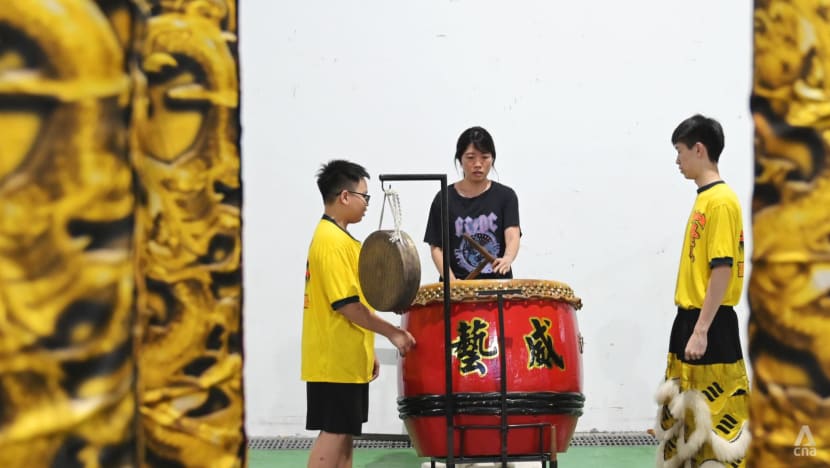
Then my first "teacher", a 14-year-old named Ayden who plays the drums in his secondary school’s military band, gave me a reality check.
Demonstrating the beats of “cai qing” (a popular ritual during Chinese New Year representing wealth and prosperity where the lion performs acrobatic acts to “pluck vegetables”), he tapped away at the drum like it was second nature. He then handed me another pair of drumsticks: “You try.”
Any hidden drumming talent of mine stayed hidden. As it turned out, lion dance music doesn’t follow the standard eight-beat count I’m familiar with from my dance background. I had to rewire my brain to leave behind what I knew, in addition to learning a whole skill from scratch.
Mastering the drum also required more than technical know-how – I had to “feel” the tempo. After an embarrassing number of demonstrations by Ayden, I still couldn’t play the basic beats sans mistakes by the end of Day 1. Every attempt sounded like a completely different iteration.
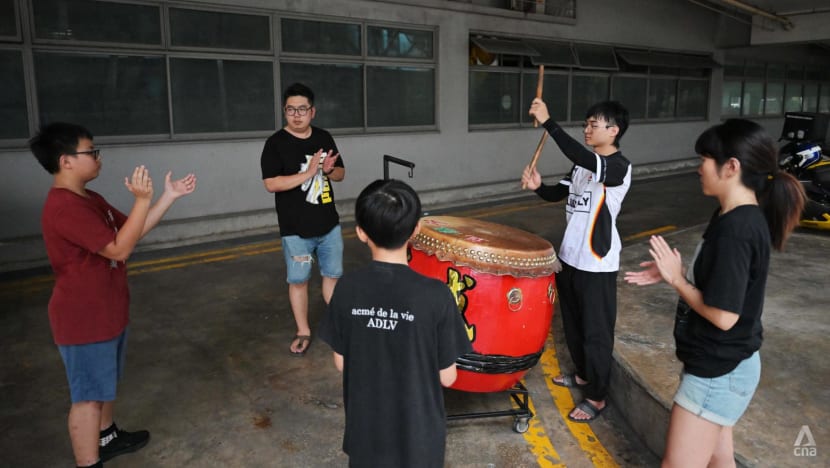
Hoping for some kind of win, no matter how miniscule, I showed up for the following practice to attempt a “simpler” instrument: The cymbals.
Perhaps it was the unfamiliar environment and culture, having to confront my mediocrity or the realisation that I'd underestimated the instruments. Ayden and Li noticed that I tended to strike the cymbals gently while memorising the drum beat and rhythm. I wanted to familiarise myself with it before going all out with the corresponding cymbal beats, I explained.
But they offered a different perspective: Crash the cymbals boldly from the get-go. The more confident one is, the faster it is to master.
"YOU CANNOT BE A BYSTANDER"
Mastery is subjective – or perhaps my expectations had just been tempered.
I initially aimed to be good enough to perform with Yiwei by the end of my time with them. But I was forced to acknowledge within the first few sessions that, much to my dismay, merely wanting to excel doesn’t remotely move the needle.
I needed practice, practice, practice, although the myriad “rules” on learning a skill differ on exactly how many hours I’d need.
There is the infamous rule that claims it takes 10,000 hours of practice to achieve true expertise in any skill. And there is another that suggests it takes about 20 hours of deliberate and focused practice to become reasonably proficient in the basics of a new skill, even though it might not make you an expert.
Instead, I realised over five weeks with Yiwei that mastering a new skill as an adult is a complex undertaking which can’t be whittled down to a one-size-fits-all formula or pegged to an arbitrary number of hours.
There is perhaps just one key rule understood by those who pursue excellence: You must show up – even when you don’t feel like it. Especially then.
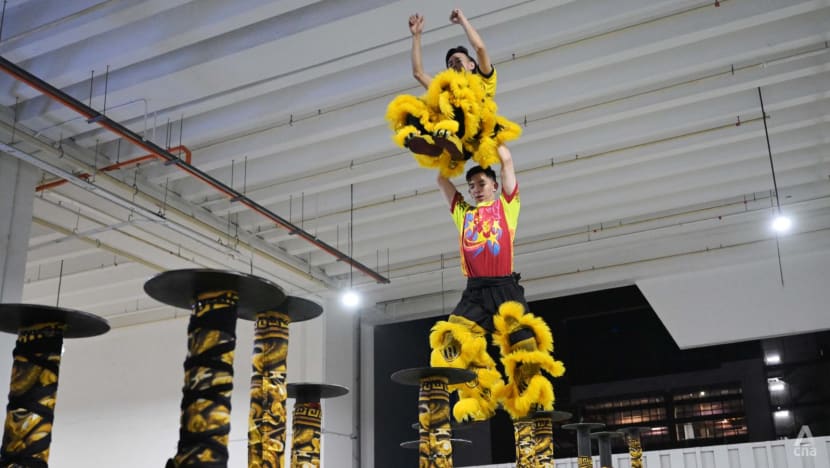
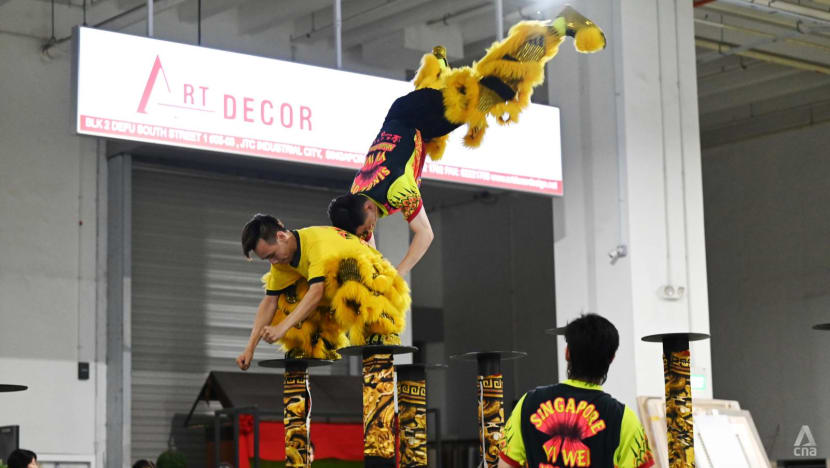
To be part of Yiwei, one of the older members Brian Lui pointed out, "you cannot be a bystander".
The 55-year-old helps the troupe with administrative work, and guided me on the instruments when my younger teachers were busy with their own training.
He said: “If you want to give 40 to 50 per cent, look for another lion dance troupe.”
The team doesn’t just train for competitions, but “any performance” that they’ve been invited to, added Li. Maintaining their stamina is important because they “must be ready to go at any time”.
For the lion pairs doing stunts, attending training regularly is even more crucial to be in tune with their partner's body movements. After all, a single wrong step might land someone in the hospital.
The winning pair at the Genting championship, Tan Xue Boon and Jarell Tock, have shown up for almost every training for the past eight years they’ve been partners, barring sickness or family gatherings.
“Morning work, night training – everyday life,” Tan, the head of the lion, rattled off half in jest. But the 26-year-old and his partner know such dedication comes with a price.
There is also added pressure for Tock, 24, to set the standard, with his father Marcus as the troupe’s head coach and younger brother Jerry as the head of the lion that placed third in Genting.
“Our commitment can really show how much we love lion dance. Time management has to be very good. In fact, sometimes our partner, our girlfriend quarrels with us because of this. So we’re very thankful (when) they’re understanding towards this hobby,” he said.
Before the pair got to know each other better, Tan suffered a sprained ankle and “a lot” of bruises. They’ve now worked out a communication system.
When Tock senses that it would be “unsafe” to jump, he would “hold down” Tan’s waist as a signal to stop, the pair shared. If there’s miscommunication, one of them may attempt to jump while the other hesitates, resulting in both falling to the ground.
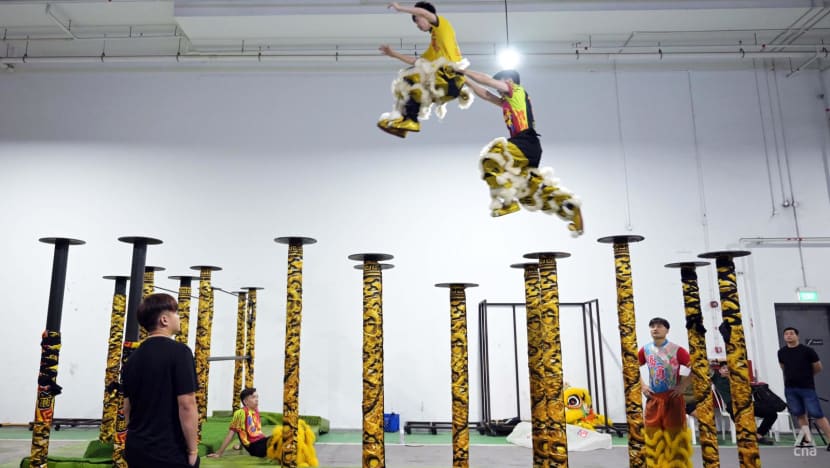
Tan and Tock shared that they spend about a week getting the hang of new stunts and ditch them if they remain too dangerous or there's little progress. Like them, I also gave myself a fixed duration (a month) to train with the troupe.
But there are less tangible markers for the successful bond that enables the duo to perform such stunts seamlessly, or that indicate I am ready to perform on stage with the team.
Talent may be critical to picking up skills, but trust among the team is needed to execute them. The latter is only built with time – and I was told many youths prefer to spend theirs on social media or a social life.
Other issues also result in a lack of new blood, the troupe shared. No matter the passion at the start, there is only a certain number of times that personal interest can override the temptation to skip three hours of training after an exhausting day at school or work. The inertia gets worse once the novelty of learning a new skill fades.
Aptitude, I found, was probably the most effective reason to stick around. Unfortunately, my absence of musicality resurfaced the familiar sting of self-doubt – my biggest hurdle to success.
FINDING ONE’S FOOTING
Self-doubt, however, can also be the biggest marker of success. It separates the good from the great, at least the way Brian Lui sees it.
The secondary school teacher by day, who has worked with youth for more than a decade, said the boys at Yiwei possess a single-minded drive to excel that he hasn’t seen among others their age. If someone makes a misstep during training, for example, they “get up straight away” so as “not to let the fear fester”.
I had been mildly self-conscious at the start because I don’t run in the same circles as Yiwei’s members, since many of them are primarily Mandarin-speaking. Neither was I familiar with the history or culture of lion dance.
All I knew was the sport lacks recognition and funding, and that it hasn’t quite shed the stigma that lion dance troupes are related to gangs or secret societies.
But the more time I spent with them, the less our different backgrounds mattered. We shared an unwavering dedication to outdo our past selves.
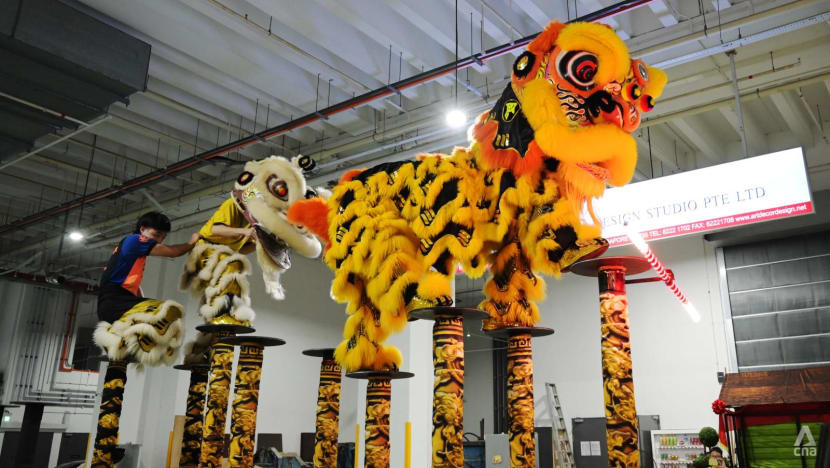
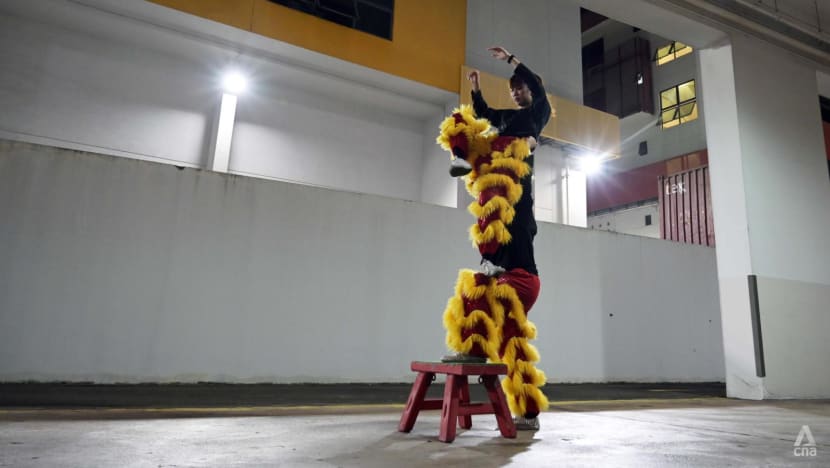
Their desire stemmed from lion dance being central to their individual identity, as well as recognising that the sport's reputation was bigger than themselves. It meant that strict discipline, rather than fleeting bursts of motivation, compelled them to turn up for training.
“Every kid has got something (they love). The question is, is it something that they want to do or something that their parents want them to do? In Singapore, that piece of paper is really important. But if you look at these boys, they’re not very academically inclined,” explained Lui.
“But you know there’s this theory about multiple intelligences. Their spatial intelligence is unbelievable. They’re athletic. And their rhythmic, musical intelligence is really top-notch.
"So this is the area where they shine; they’ve found their little niche.”
MAKING A WINNER
When Yiwei won gold in Genting, it was the first time their achievements were widely reported by mainstream English media despite the troupe having done Singapore proud previously.
I asked some members if the lack of recognition bothered them, and most seemed resigned to reality. It wasn’t ideal but it didn’t shake their desire to constantly one-up themselves.
Staying at the top of their game was about what happened off-stage. After winning the Genting championship, they immediately resumed training, their sights set on the next competition and performance.
“They wanted to be world champions and they did it. But after you hit the pinnacle, what’s next? This engine doesn’t stop,” said Lui. “You want to be world champions? You train like world champions. You sacrifice like world champions.”
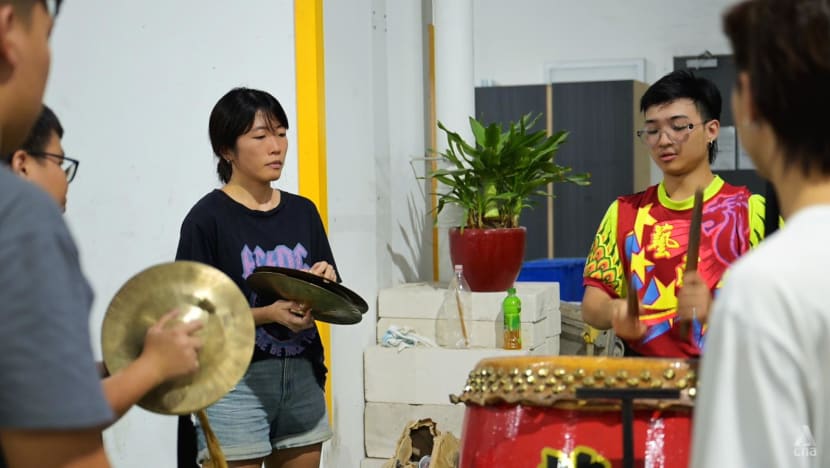
Five weeks was barely sufficient for me to scrape the surface of such sacrifice, especially since many in the troupe had joined lion dance as teenagers.
But sometime in my fourth week of practising the same cymbal sets with seemingly scant progress, I glimpsed the result of sacrifice. By then, I had embraced my mediocrity and often asked whoever had free time to drum for me so I could familiarise myself with the beats over and over again. I would usually fall out of sync on the cymbals, but I'd make a mental note of my mistake and repeat the set.
Then I happened to play through an entire set without a single slip-up.
I did it again in a subsequent session. Then again in another session. And then again, when I attempted to teach a 12-year-old newcomer the cymbals and the very beats that had caused me grief a month prior.
It took me four weeks of heading to the Defu industrial area several times a week after work to immerse myself into an unfamiliar culture and learn a new skill to fully grasp the basic sacrifice demanded by the pursuit of excellence.
It isn’t about giving up personal relationships or work-life balance. Neither is it about giving up other hobbies or passions.
From the start, excellence requires giving up one’s comfort zone.















